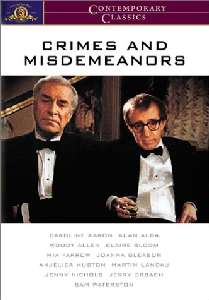| Along with Deconstructing Harry which would follow seven years later, this is Woody Allen's most somber comedy-drama, as well as his most ambitious film of the 1980s. Allen weaves together two central stories about very different groups of Manhattanites, linking them through a mutual friend, a rabbi (Sam Waterston) who's going blind. This image is key to the sometimes ponderous, often clever musings on faith, morals, and vision (or lack thereof) that obsess his deeply troubled and unhappy characters. At its center, the film explores people who, through lack of religious conviction or arrogance, rationalize their awful, selfish acts by presuming that God couldn't possibly be watching. The central story--a neo-noir of sorts--follows a fortuitous ophthalmologist (Martin Landau, all sweat and grimaces) who faces the prospect of his obsessed mistress (Anjelica Huston) ruining his life by telling his family of their affair. Desperate, the doctor hires his slimy criminal brother (Jerry Orbach) to eliminate the situation, and then suffers overwhelming regret afterwards. The flip tale is more typical Allen. Funnier and lighter, it focuses on an impossible romance between Allen's character and Halley Reed, a film producer played by Mia Farrow. Between Allen and his Hollywood fantasy stands his brother-in-law (Alan Alda, perfectly cast as an obnoxious, successful sitcom producer), who also desires Halley. Allen is Landau's opposite: an honest, struggling documentarian who cares nothing about fortune, suffers in a loveless marriage, and is surrounded by triumphant phonies. The nice-guys-finish-last moral may be as contrived as it is devastating. Yet, when Landau and Allen finally share a final scene during a wedding, their faces, subtle body movements, and contrasting fortunes somehow suggest that indeed God may be blind, and if not, the deity has a very sick sense of humor. --Dave McCoy |
